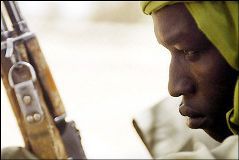INTERVIEW-Rebels urge oil sanctions on Sudanese government
By Silvia Aloisi
N’DJAMENA, Sept 23 (Reuters) – The international community should slap sanctions on Sudan’s oil industry, a top rebel negotiator said on Thursday, accusing the government of using revenues from the sector to help bankroll Arab militias.
 “The international community should not wait. They should go ahead with the sanctions immediately,” said Sharif Harir, chief negotiator for the political wing of the rebel Sudan Liberation Army (SLA).
“The international community should not wait. They should go ahead with the sanctions immediately,” said Sharif Harir, chief negotiator for the political wing of the rebel Sudan Liberation Army (SLA).
“The government’s forces and the Janjaweed are the same, and the oil resources are used to arm fighters,” Harir told Reuters in N’djamena, the capital of Chad, Sudan’s western neighbour.
The U.N. Security Council adopted a resolution last week threatening Sudan with oil sanctions if Khartoum does not rein in Arab militias, known as Janjaweed and accused of terrorising African villagers in a campaign Washington has called genocide.
The U.N. says fighting in Darfur has killed some 50,000 people, driven about 1.3 million from their homes within Darfur and another 200,000 across the border into Chad. It has called Darfur one of the world’s worst humanitarian crises.
“The international community should make the government understand that they are not sitting and looking while genocide is being committed … They (the government) should negotiate under sanctions, under pressure,” Harir said.
“If oil is suffering, if they feel the pinch on their coffers, then they will start thinking. Otherwise, it won’t lead anywhere,” Harir said.
WHO SUFFERS FROM SANCTIONS?
Sudan produces more than 300,000 barrels of crude a day and makes more than $2 billion from oil annually.
The Sudanese government, which denies any link to the Janjaweed militias, has said it would try to comply with the resolution but called it unfair. It also said sanctions would harm ordinary Sudanese.
But Harir, who led the SLA delegation at peace talks in Nigeria which were adjourned earlier this month with little sign of progress, accused the ruling party of keeping a tight grip on the country’s resources and said only the elite would suffer.
“Access to resources in Sudan is only for a few. Everything is controlled by (President Omar Hassan) al-Bashir’s party — whether you want a job or a house, you have to be a member of the ruling party’s fraternity,” he said.
“So oil sanctions wouldn’t hurt ordinary people. How would the 1.3 million people displaced in Darfur be hurt? They are not getting anything from this government anyway,” he said.
The SLA is one of two groups that began an uprising in 2003 after years of skirmishes between mainly African farmers and Arab nomads over land and water in a region the size of France.
